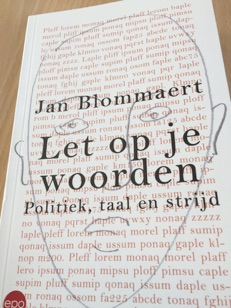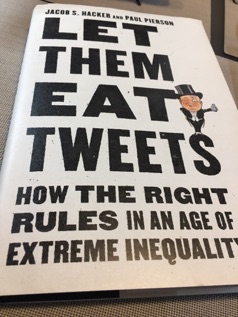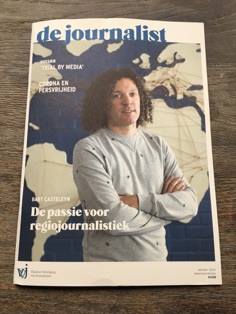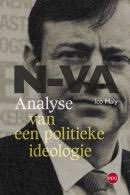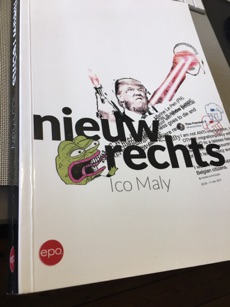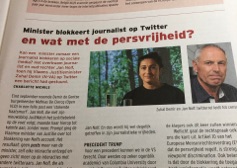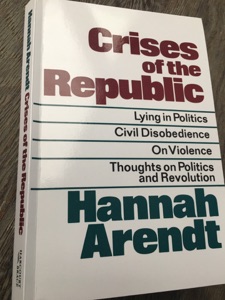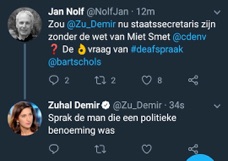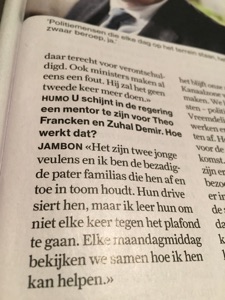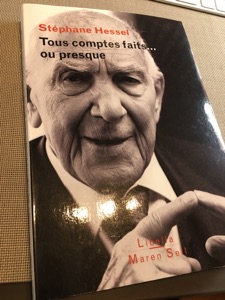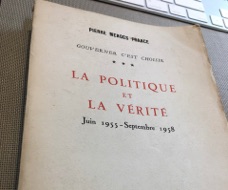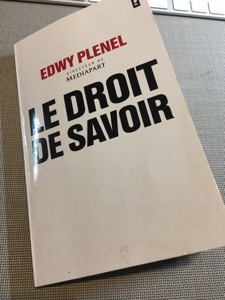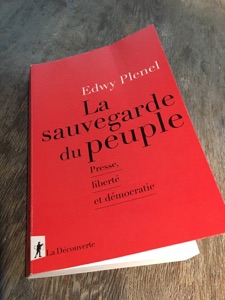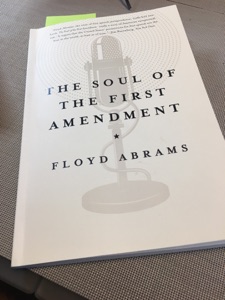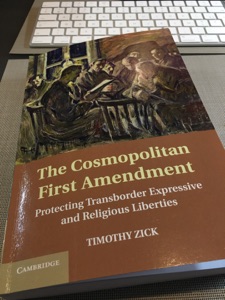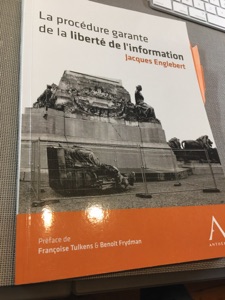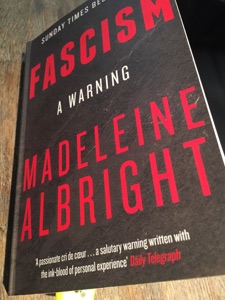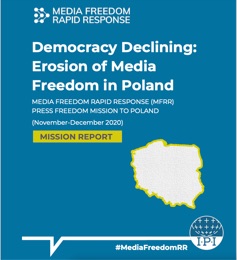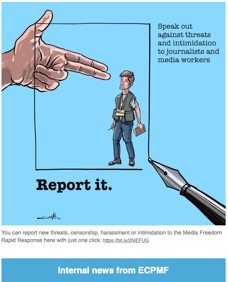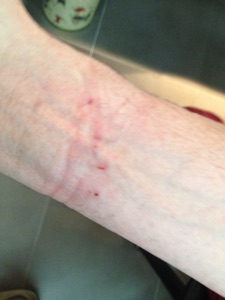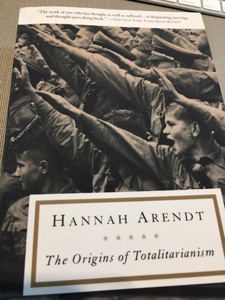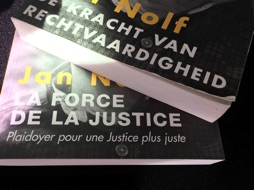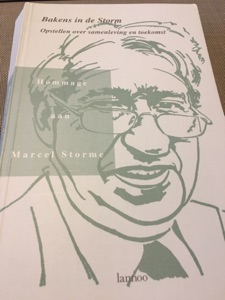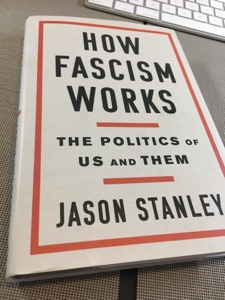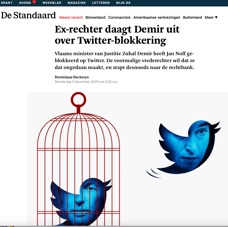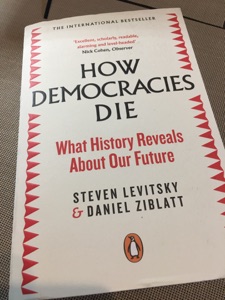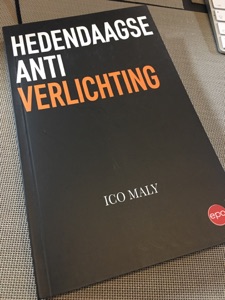QUESTIONING JUSTICE
2020/21

After the Repolonisation of Poland… the Polonisation of Flanders?
First about newspapers.
I love to read old newspapers and have a collection of them dating back to 1914-1918 and 1939 – 1945. Not the originals, but those re-edited recently to remember us a past not so long ago (De Oorlogskranten – The War Newspapers, published by CegeSoma, The Study- and Documentation Centre for War and Contemporary Society in Brussels).
That’s why I remember the blank, white spaces newspapers published in Belgium and France as a result of the censorship under the military rule of an occupying authority.
Today, the colour is not blank but black: black frontpages.
On February 10th, Poland’s remaining private newspapers had black front pages, with the single and short message ‘Media without choice’.
The remaining independent media outlets suspended their publications as a protest against a new advertising tax. Webpages and TV screens turned dark.
One newspaper (Rzeczpospolita) published the warning of its editor, Boguslaw Chrabota that this tax is part of “systematic revenge” of the ruling party against the media for acting as a watchdog.
As Vanessa Gera and Monica Scislowska (Associated Press) wrote in The Washington Post that Wednesday: “The tax proposal comes amid an erosion of media independence in Poland, which has been following a path taken by Hungary under autocratic Prime Minister Viktor Orban. The EU has for years expressed concerns about what it views as an erosion of democracy in Poland and Hungary, two countries once admired as models of democratic transition from communism.”
‘Erosion’ is a notion of fundamental importance here.
Then about feathers.
Democracy is not only in danger when you hear the boots in the street or the glass of windows breaking. In fact, at that moment, democracy is already lost.
And as the Trump Capitol uprising demonstrated, sometimes democracy must be protected not just by pens and paper, but also by boots of armed police on the street.
Erosion of democracy was best described by former Secretary of State Madeleine Albright in ‘Fascism. A Warning’ (Harper Collins Publishers 2018): “Mussolini observed that in seeking to accumulate power, it is wise to do so in the manner of plucking a chicken – feather by feather.”
She added: “His tactics live on in our no-longer-new century. When we awaken each morning, we should see around the globe what appear to be Fascism’s early stirrings…” (p. 118).
The day after the free press action day in Poland, I read the Media Freedom Rapid Response report, then just released by the European Centre for Press and Media Freedom, and attended the webinar of the International Press Institute (IPI), corresponding with the launch of that report “which concludes that Poland now faces its greatest set of challenges since 2015 as the ruling Law and Justice (PiS) party continues to wage a multi-pronged attack on independent media in an effort to muzzle critical reporting and undermine independent journalism.”
Now about handcuffs.
Here, in my writer’s room, along the canals of Bruges I could comfortably follow this webinar but it reminded me that a 100 meters from here, after taking some pictures of a police action against football fans in the night of August 26th 2015, I got handcuffed by some heavy-handed policeman. Not with my hands tied in front of me as a suspect, but as a dangerous criminal: with my hands on my back and my face against the wall. It lasted less than 15 minutes, until a policewoman recognized me and shortened one of the most interesting episodes in my life. Months later, The Standing Police Monitoring Committee (Comité P, working under the supervision of the Belgian Federal Parliament) would point the local police the failures in their action.
So, I was still privileged. When two policemen grabbed me in the back and I was handcuffed, I did not tell them who I was. They even did not ask my identity or my papers. And finally, they freed me because of my identity – a privilege. So, they arrested me for the wrong reason, and they freed me for the wrong reason.
In many parts of Europe, this privilege of being freed – as a well-known writer and journalist – does not exist. On the contrary, it’s a reason to handcuff you, to prosecute you, to condemn you, as you are a danger for the powerful.
But there are many other ways to silence voices of journalists and ‘manage’ the minds of citizens.
You can find the Mission Report of the Media Freedom Rapid Response (MFRR) team on Press Freedom in Poland on the website of ECPMF (link here) and it is a very interesting read.
It is very interesting to read that the plan of the Polish Ministry of Culture to “repolonise” (and “deconcentrate”) the media market “ostensibly aimed at creating greater pluralism”. That’s how the PiS – party tries to sell it to its critics. In reality, MFRR finds, “these dual legal mechanisms are intended to concentrate more media under the control of the ruling party and its allies. If passed, both would pose a major threat to media freedom and come into direct conflict with EU law” (p. 4).
This reminds us of the warning by Albert Camus: “Faites attention, quand une démocratie est malade, le fascisme vient à son chevet mais ce n'est pas pour prendre de ses nouvelles. "
(‘Beware, when a democracy is sick, fascism comes to its bedside, but it is not to take news of it.’).
There is still some good news in the key findings by MFRR. They confirm “the continued independence of Poland’s lower courts has blunted the worst of those (SLAPP) attacks.” But of course this pointedly “underscores the clear connection between media freedom and judicial independence in Poland amid the EU’s ongoing Article 7 procedure against Warsaw regarding pressure on courts and the rule of law” (p. 6).
As I wrote in an article accompanying the publication of The War Newspapers 1914-1918 on the strike of the Belgian magistrates during World War I: “A judge ruling completely independently, that takes courage. Physical courage during World War I, intellectual courage today. A century later, a new occupier holds the country in a stranglehold: populism.” (‘Populism, The New Occupier’, De Oorlogskranten 15 10 2014).
However, matters are now deteriorating for again magistrates and journalists alike.
About politics in Flanders (region of Belgium)
In Belgium, Theo Francken (of the Flemish nationalist and separatist party N-VA) used to fulminate in his capacity of State Secretary for Asylum and Migration (2014 – 2018) against the “Lax Judges” (lakse rechters) and leftist press – his two favorite targets.
He was the very first politician who blocked me as an immediate reaction to my opinion in the newspaper De Standaard of December 4th 2014. I wrote about two Armenian kids (without residence permit) who were arrested by the Turnhout police on their way to school and pleaded: “Let those kids stay here (to study)” (‘Laat die kinderen blijven’, De Standaard Avond 04 12 2014).
His blocking of me on Twitter was followed by many in his party (N-VA). My collection of ‘Twitterblockers’ includes now the earlier president of the Federal Belgian Parliament, Siegfried Bracke (blocking since 18 04 2017), the actual President of the Flemish (regional) Parliament, Liesbeth Homans (blocking since 29 03 2017), Louis Ide, the secretary general of N-VA ( blocking since 07 09 2018) and some of their members of Parliament.
I must mention especially Pol Van Den Driessche (blocking since 17 07 2016), ex-senator of N-VA who failed in 2012 to become Mayor of the city of Bruges. His case is very interesting, as he worked as a journalist and became the communications specialist (or ‘spin doctor’) of that party. In April 2012 he was accused of sexual intimidation in an article ‘DSK in Flanders’ in the magazine Humo. Van Den Driessche claimed damages against Humo and journalist Jan Antonissen up to 500,000 euros in lost income, mainly calculated on the salary of the Mayor of Bruges, and 125.000 euros as moral compensation. The court of Leuven dismissed this claim completely on April 24th 2013 and added that Antonnissen and Humo used correct and credible source material.
In my article in the newspaper De Morgen of May 23rd 2013 I concluded “in Leuven, the watchdog of the rule of law was spared. He doesn't have to meow, he still can bark.”
However, in that same article, I discussed two other cases.
About that other jurisprudence in Flanders.
Entrepreneur George Forrest – reported to be one of the richest men in Congo – prevailed against the ‘Congo’ cartoon in MO*magazine before the Brussels Court of Appeal. "With that kind of argumentation, just about any cartoon or caricature can be condemned," sighed Professor Voorhoof (UGent) in De Juristenkrant (Journal of Jurists, Kluwer Edition 16 01 2013).
Yves Desmet, then editor-in-chief of the newspaper De Morgen was condemned to one symbolic euro (on the 19.000 claimed) following a complaint by justice of the peace Schoeters, proceeding rather as the wife of Yves Liégeois, the Antwerp attorney-general.
The debate concerned the Settlement Act (extended amicable settlement in criminal cases, including for major fiscal fraud) and the so-called "Diamond War" within the Antwerp Prosecutor's Office. In his opinion in 'De Gedachte' (De Morgen, January 12th 2012), Yves Desmet also briefly mentioned the cultural excursion of Antwerp judges in the Indian Jain temple but referred mainly to the position of the public prosecutor in connection with a culture of social fraud which, according to his 2011 Mercuriale, "heralded the end of democracy". Desmet calculated the proportions and estimated an annual loss in corporate taxes through the diamond fraud equal to the amount of "all the fraudulent living expenses for three years". He concluded, "You could almost call it an 'appearance of partiality. Or, should the word not sound so old fashioned, pure class justice".
The Mechelen court considered the publication in De Morgen "wrong from the point of view of objective reporting". The court ruled that the good name and reputation of the public prosecutor (and by extension his immediate entourage) had been damaged by "terms that create an impression of corruption or partiality".
The Mechelen verdict (of January 15th 2013 erroneously dated… 2015) considered that this civil sentence of 1€ "in no way restricts the freedom of expression of anyone".
The Antwerp Court of appeal finally dismissed the case in April 15th 2015, although not without failing to understand the fundamental difference between an article that published an opinion (as Desmet did here) and factual or investigative journalism.
I pointed to the problem in my Law Blog: “According to the Court of Appeal, the criterion of truthfulness can also be tested against value judgments. The Court then examined whether Desmet had investigated the (factual) basis of his opinion as a careful journalist would have done. For example, it is held against Desmet that Yves Liégeois was not given the opportunity to comment. The Court also refers to press releases that gave a different version of the so-called Diamond War, including the position of Annemie Turtelboom, the Minister of Justice at the time, and the investigation of the High Council of Justice. The court then does conclude that Yves Desmet was negligent in "insufficiently examining the facts that would support his opinion for their truthfulness".
However, no concrete sanction was attached to this (civil, not criminal) negligence by the Court of appeal, in order not to limit the exercise of freedom of expression.
Although it may be a relief for the free press that no sanction was imposed and that the very questionable judgment in the first instance did not legally stand, this judgment still raises new questions. After all, it may lead to circular arguments.“ (‘Yves Desmet krijgt (on-)gelijk’Law Blog Justwatch 15 04 2015)
This brings me from the ‘Repolonisation’ of Poland, to the ‘Polonisation’ of Flanders.
The ECPMF-MFRR Press Freedom Mission to Poland notes “Journalists in Poland work in a hyper-polarised society in which threats and insults linked to their profession have become increasingly normalised in recent years. As media have become enmeshed in “culture wars”, social media vitriol has increasingly been targeted at journalists on both sides of the political spectrum. Many Polish editors interviewed by the mission said their reporters were routinely vilified, discredited and delegitimised in smears in pro-government media or by PiS officials. Tried-and-tested accusations include journalists being dismissed as “anti- Polish”, “political activists… ” (p. 6).
In the 8th and 9th European Parliament, the Polish PiS and N-VA are part of the right-wing European Conservative and Reformist political group (ECR) – enjoying a high cohesion rate in parliamentary votes.
Until December 2020, the Dutch ‘Forum voor Democratie’ of Thierry Baudet was a member too, but their 3 delegates (with Derk-Jan Eppinck as president) left the party to form a new party JA21. Derk Jan Eppinck was from 2009-2014 member of the Europariament for the rightist Flemish party of Jean-Marie Dedecker, (himself now member of the Belgian Federal Parliament with N-VA).
The MFRR report mentions several characteristics of the PiS party and its tactics, that remind us those used by Flemish right-wing political parties as N-VA and Vlaams Belang.
Also in Flanders, although more present than ever in public media channels, they repeat a Calimero – refrain. Complaining in Newspeak (Orwell, 1984) about ‘cancel culture’ they aim – as PiS - at “rebalancing” the country’s media landscape in the name of greater pluralism. Behind this rhetoric, however, the true aim is to destabilize and weaken the influence of critical media while strengthening media aligned with (their) own nationalist agenda” (MFRR report p. 7).
In that autocratic tradition, N-VA (eternal president) Bart De Wever refuses interviews with critical journalists (Joël De Ceulaer, senior writer newspaper De Morgen) and newspapers (De Standaard) or on line media (Apache, victim of SLAPP) illustrating a “fortress mentality (as the PiS leaders) who see critical journalism and investigative reporting as “oppositional”, rather than part of a democratic system’s necessary checks and balances” (MFRR report p. 8). This is part of their autocratic and paternalistic ideology, “the view that they alone represent the “will of the people” and wield a monopoly on truth” (p. 7).
The essence of their populism finally is to bypass the press and communicate directly with their ‘followers’ on social media.
Answering my question on that topic during the ECPMF-MFRR webinar, Witold Glowacki (editor and columnist at Polska Times) emphasized “Poland was on the avant-garde in using social media as a political technique and a lot were used with the help of trolls to neutralize independent media"
Certainly, Glowacky warned in the report (p 12) sometimes there will be “a quiet period”, only to be followed by largescale executive changes.
In Flanders, the next presidency of the board of public television (VRT) is claimed by N-VA with Geert Bourgeois (their member of EU Parliament) as their candidate. Bourgeois claimed it with a big smile an interview with VRT (De Zevende Dag 13 12 2020) : I have the profile for it. I am for a strong public broadcaster. I am for a broadcaster that is open-minded Flemish. I am for a public broadcaster as a great bearer of culture, as a promoter of the standard language and quality journalism'.
In his doctorate ‘N-VA, Analyse van een politieke ideologie’ (EPO Uitgeverij 2012), prof. Ico Maly (Tilburg and Antwerp University) emphasized years ago already its “anti-enlightenment thinking (and) an interpretation of democracy as the temporary dictatorship of the majority. The right to democratic resistance is not appreciated in NVA when it holds the majority. (p. 262 – 263).
Bart De Wever tried to form a coalition with the far-right Vlaams Belang during the whole summer of 2019. This did not succeed, as no third Flemish party agreed to go along to break the ‘cordon sanitaire’, a resolution of November 19th 1992 against the 70 points program of the Vlaams Blok (a declaration of all parties, except Vlaams Blok, renewed in the ‘Charter for Democracy in 2000).
However, this was only a numerical defeat. In terms of content (and political pressure from both N-VA and Vlaams Belang), it is much more important to note that the final Flemish majority (formed on October 2nd 2019) decided on the virtual implementation of the very first point of the 70 point program of then ‘Vlaams Blok’ (since its conviction for racism by the Ghent Court of appeal on November 9th 2004, operating as ‘Vlaams Belang’),.
Ico Maly (also autor of ‘Nieuw Rechts’ and ‘De hedendaagse anti-verlichting’, EPO Uitgeverij 2018) warned already about this in 2012 and it has been announced as a triumph by Flemish minister of Justice Zuhal Demir: the end of the inter-federal competence of UNIA, the independent public institution fighting in Belgium against discrimination and promoting equal opportunities. Up till now in Belgium, UNIA is active at the federal level as well as at the level of the regions and communities. However, under pressure of N-VA in the new Flemish government, the end of UNIA's operation in Flanders was recently announced.
Last week, a 3 weekly so called documentary started on the public television channel VRT about “an unseen insight into the mind of Bart De Wever”, the N-VA president who just now announced his interest for another mandate after 2023. It is worth mentioning this presidency is limited to 2 mandates, and he started only a sixth mandate in November 2020.
Caesarist mayor Bart De Wever loves those shows.
On November 7th 2017, television crews of all media filmed him driving himself a police car with running sirens against the one-way traffic in what was presented as a promotion for driving lessons for policeman. I never received a full answer on my questions about what I considered an illegal promo tour, but it served the mayor as a good macho show.
On his Facebook page of February 2nd 2018, he posed on the top of the armoured Antwerp Police Bearcat, mixing public property, party politics and infotainment humor: "With these vehicles, the police in Antwerp can tackle any situation to protect our citizens. Also handy if you've lost the keys to the front door".
Peter Casteels of the magazine Knack commented the new documentary of Petra De Pauw (not known for any experience in that field) “most resembles a sketch show, with all the sketches devised by De Wever in advance. He does this, of course, not badly. There are witty moments in BDW, sometimes even touching ones, and his political commentary is always entertaining. But there is not one sentence in BDW that BDW himself would not have liked to have included. De Pauw is merely a good prompt for his one-liners” (‘Knack 11 02 2021 ‘Waarom bestelt de VRT in hemelsnaam zo’n documentaire ?’).
You would wonder why a party so rich with tax money (10 euro/vote), could not make that kind of promofilm itself.
According to journalist Matthias Verbergt, “In 2019, 72.2 million euros of tax money went to the parties. With 12.5 million, the N-VA was the biggest gobbler, followed by the PS. Vlaams Belang grew to 5.2 million, but that amount will still swell considerably, because the number of parliamentary seats of the party only multiplied in half of 2019”.
Verbergt emphasizes “parties are therefore using the money in an attempt to create returns to sustain themselves, without voters if necessary. For example, the N-VA has 12.3 million euros in investments outstanding, while the party also invested in real estate that it rents out” (De Standaard February 15th 2021).
With tax money pouring in, far-right Vlaams Belang spent even more per Belgian than Democratic presidential candidate Joe Biden spent per American in full U.S. elections (source: journalist Koen Van de Sijpe in newspaper De Morgen of August 10th 2020).
When as a party, you can buy your own ‘Pax Media’ like this, we could be in for “a quiet period” but a disquieting silence of democratic criticism.
And there is other disquieting news that “quiet period” could bring.
About violence in Flanders
Violence could erupt soon and suddenly.
End of January 2021, the East Flanders public prosecutor's office has submitted a request to lift the parliamentary immunity of member of parliament Dries Van Langenhove. The public prosecutor's office conducted a judicial investigation into Van Langenhove (Vlaams Belang, and leader of the Schild & Vrienden’ movent) for two years for possible violations of the racism law, negationism law and weapons law. He posed on social media with weapons and announced on Facebook (on September 4th 2020) “Friends the moment has come the revolution is near”.
In a reaction against this request of the prosecutor, his Vlaams Belang party president Tom Van Grieken appeared this Sunday February 14th 2021 in the commercial television VTM studio interview with pepper spray (forbidden in Belgium). Van Grieken thinks "that every woman in Flanders should have pepper spray in her pocket" and says that his party itself will submit a proposal to legalize pepper spray.
Last Thursday, February 11th 2021 it became known the Antwerp public prosecutor's office wants to prosecute thirty (30 !) officers of the Antwerp police department responsible for guarding and transporting prisoners to court. An internal Whatsapp group they used appreared full of disgusting talk. The officers bragged about violence and shared photos of detainees that were commented on enthusiastically. Fifteen members of the service are also suspected of racism and discrimination.
This Saturday, February 13th 2021 the newspaper De Standaard published a list of Flemish right-wing nationalist groups who threaten with violence. The extremists of yesterday (as Voorpost) are not extreme enough anymore.
The Flemish Peace Institute reported that about three thousand people are linked to right-wing extremist organizations in the police database. A multiple of these receive online propaganda messages from those media. In Brussels, Ostend, Mechelen and Puurs, illegal marshes were held, sometimes accompanied with neo-Nazi reference on clothing visible and Hitler salutes.
The Hitler salute is known for variations and some bizarre explanations. In October 2018, after the (almost) victory of ‘Forza Ninove’ in that city, they “were just singing: 'It's quiet on the other side'. At that moment I also raised my arm and a picture was taken by the photographer, after which the picture was interpreted completely wrong." (Het Laatste Nieuws 15 10 2020).
One day indeed, it may be quiet on the other side.
It was quiet on the other side, in the night of November 10 2019 after the arson attack on the ‘Ark van Noe’ in Bilzen. The empty residential care center in Bilzen was to become an asylum center where 140 asylum seekers would be housed. As the building burned down, dozens of bystanders, including Emmanuel M., loudly expressed their approval. There are other reports of Emmanuel M., “forcing neighbours to move elsewhere, tired of his insults, afraid of what this brutal neighbor might do” (De Standaard 10 12 2020).
Indeed, according to witnesses in De Standaard, “He and two others were dressed in Ku-Klux-Klan outfits, running amok and harassing a Nigerian family. The incident was filmed with a cell phone. The police opened an investigation, but M. dismissed it as a costume party after a barbecue”.
Emmanuel M. was present at another ‘costume party’. De Standaard tranced his pickup truck with Nazi symbols during Vlaams Belang's 'Not my government' demonstration of September 27th 2020 at the Heysel in Brussels. On the trunk were stickers of an eagle, an Odal - a letter sign from the runic alphabet, which was picked up by various SS groups during World War II - and the text ‘Wer plündert, wird erschossen.’ – an old nazi warning.
About the Flemish minister of Justice.
However, the Flemish minister of Justice Zuhal Demir (N-VA) considered this Brussels meeting on her official Twitter account a meeting “of people who are justifiably angry and protesting”.
When I tweeted a reaction (quoting ironically her own N-VA president!), the minister blocked me.
To keep that ‘other side’ quiet, many tools exist, as the ECPMF-MFRR report demonstrated.
Some are loud and violent. Others are quiet but even more efficient.
Blocking citizens and journalists on Twitter is one of them.
To quote the ECPMF-MFRR report again: “This deepening polarisation in Polish society is resulting in escalating online harassment against journalists. All those interviewed said the daily work had become more challenging due to an increase in threats (…)
Journalists are subject to discrimination (in their) access to information. Public officials connected to the ruling party refuse communication/interviews with certain media (and deny) access to publicly held information without explanation. Critical reporting about officials or institutions is sometimes met with retaliation in the form of cancellation of accreditation or blocked entry to political events” (p. 7).
The twitter account of the Flemish minister of Justice (the first ‘minister of Justice’ in Flemish history!) is such a media source and closed for me since September 2020.
A mediation with minister Demir is still under way with the help of VVJ (the Flemish Union of Journalists).
I hold out hope for fairness and respect.
Zuhal Demir is the only minister in the Flemish government who blocks me and nobody in the Federal Government does. She acted in anger and anger is a bad adviser (as Seneca wrote in ‘De ira’).
When they were still in the federal government together, the current Flemish minister president Jan Jambon (in the magazine Humo of April 23, 2018) described Demir and Francken as "two young foals and I am the sedate paterfamilias who keep them in check from time to time. Their drive is to their credit, but I teach them not to hit the ceiling every time. Every Monday afternoon we look together at how I can help".
I am patient, but I will not be silenced.
Indeed, after polarization, Flanders seems to be on track for Polonisation.
Slowly and mostly quietly.
As a former judge, nominated in 1987 in times where such appointments were purely decides by politics, I remember the duty of independence that nevertheless was mine from my oath on.
I learned already as a student the link between politics, media and law. The late professor Marcel Storme - my professor at the Ghent University, then member of the Board of Directors of the BRT, now VRT - arranged my first participation in a VRT- television debate on March 7th 1976. It was the first edition of the Sunday talk show ‘Confrontatie’ – that day about legal aid and justice in Belgium.
Professor Storme who became a senator in 1977 called this duty of the judge “le devoir d’ingratitude” (‘the duty of ungratefulness’).
That (legal) expression traces to me the (press) logic of ‘Le Canard Enchaîné, the French Weekly I read every Wednesday since decades: “La liberté de la presse ne s'use que quand on ne s'en sert pas” (‘Freedom of the press only wears out when you don't use it.’).
As the ‘Canard’ is a bird, they remember Madeleine Albright’s warning: “feather by feather”…
(read further about Free Press & Free Speech on my Law Blog Justwatch)
the polonisation of flanders
15 februari 2021
“Mussolini observed that in seeking to accumulate power, it is wise to do so in the manner of plucking a chicken – feather by feather.”
Madeleine Albright
